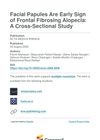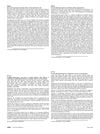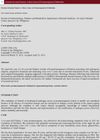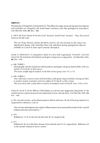January 2021 in “İzmir Dr.Behçet Uz çocuk hastanesi dergisi” Children with Alopecia Areata often have lower vitamin D and B12 levels and higher thyroid activity.
[object Object] 
COVID-19 may increase hair loss, and Nourkrin® could help treat it.
 August 2020 in “Acta medica Iranica”
August 2020 in “Acta medica Iranica” Bumps on the face may be an early sign of a type of hair loss called frontal fibrosing alopecia.

5α-reductase inhibitors are effective for treating hair loss in androgenetic alopecia.
September 2019 in “Mağallaẗ al-ʿulūm al-ṭabīʿiyyaẗ wa-al-ḥayātiyyaẗ wa-al-taṭbīqiyyaẗ” Camel hair from Afif can be improved for textiles by adding chemicals or blending with other fibers.
 October 2018 in “Ayurlog: national journal of research in ayurveda science”
October 2018 in “Ayurlog: national journal of research in ayurveda science” The review suggests that lifestyle, diet, and environment affect hair loss, and Ayurveda offers ways to maintain hair health.
 January 2018 in “Clinical dermatology open access journal”
January 2018 in “Clinical dermatology open access journal” The Biofield Energy Treated herbal mixture increased hair growth in mice compared to the untreated mixture.
PRP therapy is a simple and safe option for hair loss, but its effectiveness is not clearly stated.
Type XVII collagen helps control skin cell growth and may have anti-aging effects.
 January 2017 in “Korean Journal of Pharmacognosy”
January 2017 in “Korean Journal of Pharmacognosy” Modified red ginseng extract promotes hair growth and has antioxidant and anti-inflammatory effects.
 January 2016 in “Kafkas Journal of Medical Sciences”
January 2016 in “Kafkas Journal of Medical Sciences” Turkish pregnant women commonly experienced skin issues like itching and acne, and doctors mainly used topical treatments due to safety concerns during pregnancy.
 March 2014 in “Journal of The American Academy of Dermatology”
March 2014 in “Journal of The American Academy of Dermatology” Mycophenolic acid may help hair grow by activating pathways important for hair growth.

Keratin hydrogels from human hair show promise for tissue engineering and regenerative medicine.
 September 2013 in “Molecular Biology”
September 2013 in “Molecular Biology” The document suggests that activating autophagy might help with regeneration by removing old and damaged cells.
 May 2013 in “Journal of the ASEAN Federation of Endocrine Societies”
May 2013 in “Journal of the ASEAN Federation of Endocrine Societies” Ovarian stromal tumors are a rare cause of women developing male characteristics after menopause.
 September 2012 in “Dermatologic Surgery”
September 2012 in “Dermatologic Surgery” Laser and light treatments might help hair growth and transplant success, but the findings could be outdated.
 June 2011 in “Oncology times”
June 2011 in “Oncology times” Dr. Mario Lacouture recommends preventive and specific treatments for skin side effects caused by EGFR inhibitors to improve patients' quality of life.
 March 2005 in “International Journal of Cosmetic Science”
March 2005 in “International Journal of Cosmetic Science” A new method helps understand hair shine and various products improve hair care.
September 1998 in “Journal of the European Academy of Dermatology and Venereology” PUVA-turban therapy can help some people with severe alopecia areata regrow hair.
 January 1997 in “Elsevier eBooks”
January 1997 in “Elsevier eBooks” Hair and nails are skin parts that develop early and serve protective and functional roles.
February 1996 in “Clinical Pharmacology & Therapeutics” MK-386 reduces sebum DHT levels.
 January 1993 in “Journal of International Medical Research”
January 1993 in “Journal of International Medical Research” The document corrects errors in previous articles, including a reversed term, updated subject weights, hair count data, and reference numbering.
April 2023 in “Chinese Medical Journal” Human hair follicle stem cells help repair tendon injuries.
September 2022 in “Journal of Theoretical Biology” Hair follicles can regenerate after radiation damage but not during a specific growth phase.
 April 2018 in “Journal of Investigative Dermatology”
April 2018 in “Journal of Investigative Dermatology” Platelet Rich Plasma can potentially help in restoring hair loss, but more research with larger groups is needed to confirm its effectiveness and standardize its use.

Hair loss in women can be caused by genetics, menopause, certain health conditions, and emotional stress, and it often results in thinner hair and a changing hairline.
[object Object]  November 2005 in “NEJM Journal Watch”
November 2005 in “NEJM Journal Watch” Hair count is important to distinguish between genetic hair thinning (Androgenetic Alopecia) and hair thinning caused by disrupted hair growth (Chronic Telogen Effluvium).
 March 1985 in “Inpharma (Balgowlah)”
March 1985 in “Inpharma (Balgowlah)” Minoxidil helps 32% of patients with hereditary baldness regrow hair.
 257 citations,
July 2018 in “Obstetrics & Gynecology”
257 citations,
July 2018 in “Obstetrics & Gynecology” PCOS is a complex disorder in women that can lead to various health risks and requires personalized treatment.
 132 citations,
January 2017 in “International Journal of Molecular Sciences”
132 citations,
January 2017 in “International Journal of Molecular Sciences” Fat-derived stem cells show promise for skin repair and reducing aging signs but need more research for consistent results.





















